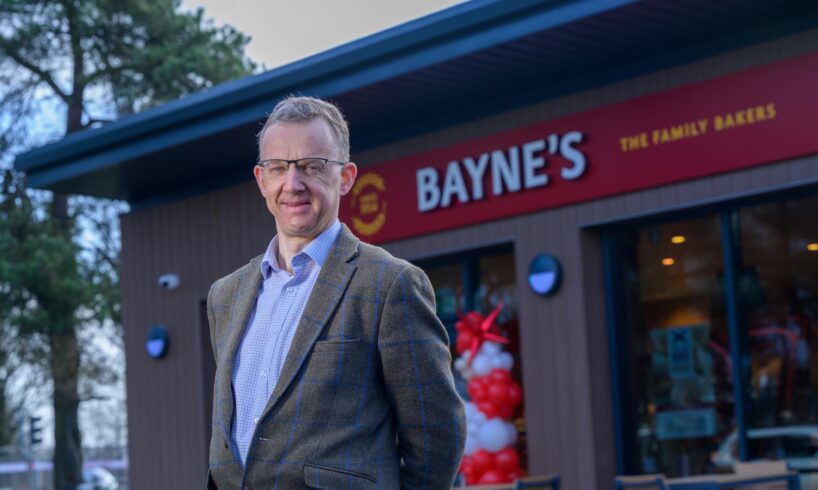
The family-owned company marked its 70th anniversary earlier this year with the opening of its 70th shop at the Inveralmond Retail Park in Perth, its fourth in the city. All outlets are serviced from Bayne’s historic home in Lochore, a former mining village in Fife, where the company’s relatively new central facility produces goods just half a kilometre from the first shop that still trades today.
“We’ve been opening in Glasgow, so there’s more opportunity there,” said John Bayne, whose grandfather of the same name set up the bakery as an offshoot of the family’s farming business. “There’s more opportunity in all the areas [where] we trade in the central belt, and probably more in Dundee.”
None of the three generations of Bayne men who have headed up the business are or were bakers themselves.
The founder’s family farm went bankrupt in 1908 when he was just age six, and his father immigrated to Canada leaving his wife and their four children to fend for themselves. She got a job as a farm worker and the landlord was eventually impressed enough with her efforts to offer her a tenancy.
“When [my grandfather] was 19 he and his brother Bill got the confidence of a banker and started selling meat in the local Glencraig area, and at that time the mines were very prominent so there was a bit of money there, and he opened his first shop and then went on to build a business with eight butcher shops, 20 mobile butcher vans, and he farmed in Kinross-shire and bought and sold cattle across central Scotland,” Mr Bayne said.
“The bakery came about in 1954. All the butchers at that time were making steak pies but they went to their local baker to buy the pastry, so there wasn’t really consistency. A bakery came up for sale and he saw an opportunity to make steak pies consistently.”
A second bakery in Rosyth followed, and this remained the case until his death in 1964 when his son Stanley took over the business. Realising that the butchery trade was coming under increasing pressure from the rise of supermarkets, he focused his efforts on expanding the bakery business.
The company now employs more than 980 people, up from approximately 620 five years ago. Stanley and his son John serve as joint managing directors, the latter having joined the business in 2001 after completing his studies at agricultural college followed by a five-year stint in charge of the family farm.
“I’m not a baker – I’m a businessman,” he said. “I’m a businessman with an obsession of making sure we do the right thing by the customer, and colleagues.”
Latest accounts filed with Companies House show that pre-tax profit for the year to March 2024 rose to £3.1m from £1.8m previously on a 26% increase in turnover to £44.5m. Mr Bayne declined to discuss the figures on more recent trading but conceded that rising costs have been a concern.
“It’s incredibly challenging,” he said. “The wage increase is the biggest by a long way, but after that there is the electric, and that’s been quite challenging. We’ve taken a hit on the margin – we have been increasing prices, but not enough to cover all the costs.
“But we are here, we take a long-term view, we’ve got a good balance sheet, and as I say we do things the long-term. And we’ve been quite prudent – we’re still profitable but we would like to be slightly more profitable.”
Bayne’s entered the Edinburgh market in 2012 and expanded into Glasgow in 2018. In 2021 the company opened its first drive-thru in Hillington Park in Glasgow, Scotland’s largest industrial estate.
Mr Bayne said he was “very excited” when he and his father first visited the site, which has come with its own challenges.
“It’s maybe been harder than we first thought, but it’s definitely been a success,” he explained. “They’re very expensive, drive-thrus, so we’re quite careful. We’d like to open some more as well, but have not got immediate plans [for that].”
Quality is “absolutely key”, he said, as are the company values of customer focus, respect, continuous improvement and sustainability. The purpose of the business, Mr Bayne added, is to give customers “moments of joy”.
“Ultimately we’re looking to open three to four shops per year but it’s not about the number,” he said.
“We are underpinned by a core set of four values and one of those is continuous improvement and sustainability. We must get better, so we are continually looking to improve conditions for colleagues, continually improving and updating our products, and if we do that we can open three to four shops per year.”





